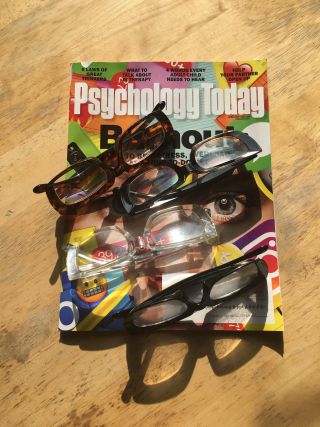Midlife
How My Middle-Aged Body Changed Just Like That
A Personal Perspective: How my chin hair, “Chucky,” has taught me gratitude.
Posted January 23, 2024 Reviewed by Michelle Quirk
In a world where youth is glorified and spread across multiple platforms, oftentimes fueled by selfies with filters left and right, it is no surprise that our culture lacks an open dialogue surrounding what happens as a woman ages.

As a middle-aged woman, It continues to baffle me that I wake up to new physical changes that I never saw coming—at all.
It started out when I couldn’t read without glasses. Not a big deal, but it felt like it happened randomly one day. Then I’m having to get up to urinate in the middle of the night, which, again, seemed to come out of nowhere.
Then, there’s “Chucky.”
Chucky is my chin hair. He is coarse, angry, orange, and will never die. He just keeps coming back over and over again just like the horror movie franchise "Child’s Play." I haven’t seen "Seed of Chucky," "Curse of Chucky," or "Cult of Chucky," but the titles pretty much sum up all that constitutes my Chucky chin villain.
Despite these ongoing physical changes, there’s something deeper going on here. There is a lesson to be learned on gratitude in the present versus regret in hindsight.
I am an athlete, and working out has always been a staple in my life. I reap the mental and physical health benefits, but, now, I feel the pressure to up my game and not take days off from the gym when really my body is fighting against me. I can’t run as fast or as far or lift as many weights, but I do my best to manage because I want to maintain a certain body, which I have self-imposed and is somewhat unrealistic.
My friend recently told me that you can measure your age by how hard it is to stand up from a seated position without using your arms or hands for support. Is that a thing? Is it a measurement of where I’m at in my mid-40s? Apparently. Have I tried it? No. I’m good.
We live in a society that celebrates youth, yet celebrates wisdom with age, but the transition from one to the other gets faded in the background.
When I look back at my body in my 20s, I wish I was more forgiving and grateful for that body during that decade. I didn’t like my body in my 20s, and I worried about my size and weight and all that comes with body obsession and expectations when it probably looked the best and performed at the highest rate given my overall lifespan.
I think of my body throughout my 30s, and found it to be fit, but I didn’t fully grasp the gift it was at the time. I was more in synch with my mind and body with less judgment, yet lacked appreciation and continued my internal criticism and fear of not being in my best shape.
When I enter my 50s, I never want to look back at my body from my 40s and ask myself why was I so hard on myself all those years when I should have just enjoyed where my body was at that time. It’s certainly better than what’s to come down the road.
I try not to regret my harsh expectations on my body that I endured the past two decades, but I certainly don’t want to look back and regret not embracing my changes now. I will enter my 50s and will inevitably be faced with a whole new set of challenges and a different body facing me in the mirror. The last thing I want to do is kick myself for not loving myself where I am today like I did in my past.
Nowadays, when I take out my tweezers to pluck Chucky, I say hi to him in the mirror. I am grateful that I only have to deal with him because one day another one is likely to appear out of nowhere on my face. Although he has been with me for several years, it is only a matter of time before the “Bride of Chucky” shows up beside him with their orange children to follow me into my later life.


